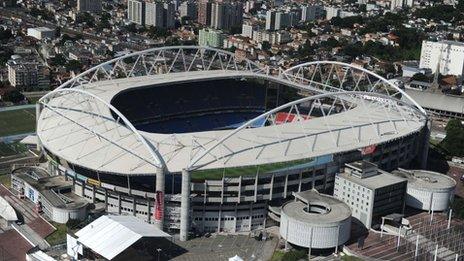Brazil venues struggle to meet World Cup deadline
- Published
- comments
See how much remains to be done at Arena Amazonia
After a spate of building problems and public protests in Brazil, the governing body of world football, Fifa, repeatedly warned there would be "no compromise" over the delivery of World Cup stadiums.
But with Fifa's end-of-year deadline looming, several stadiums are well behind schedule and one host city, Cuiaba, has told the BBC that not only will be it unable to finish its stadium on time, but there are not even enough hotel rooms for visiting fans.
Even though Fifa only insisted on a minimum of eight stadiums to host the World Cup, Brazil decided to go with 12, such was the interest and demand from all parts of this huge nation to be a part of the tournament.
But, in hindsight, has Brazil bitten off more than it can chew?
Up in the northern city of Manaus, they are finishing an arena that bears some resemblance to the famous Bird's Nest Stadium in Beijing: an elaborate steel structure, imported from Portugal, envelops the playing area like an indigenous woven basket.
But the project, which is being built with $300m (£186m) of public money, is way behind schedule.
Fifa's strict end-of-year deadline for all stadiums to be ready is almost upon us, and in Manaus they are up against the clock - struggling with the hot, tropical weather and a complex design.
Even though the local team, Nacional, rarely attracts more than 3,000 fans, officials say the expense is justified and the stadium will have a purpose after the World Cup.
As the intense tropical rain kept many of his men from their tasks, Miguel Capobianco said teams were working 24 hours a day.
Even though many of the roof supports have yet to be replaced and half the seats have been installed, the stadium co-ordinator was confident it would eventually be seen as a worthwhile venture.
"The opportunity that the World Cup brings us is the motivation, more momentum to make more investments," Mr Capobianco said as we sheltered from the rain under a portion of the transparent new roof that was already finished.
"The World Cup will really help to accelerate the economic development of the city and the region," he added.
No seats, no roof
If they seemed confident of just about making it in Manaus, more than 1,000 miles to the south in Cuiaba, the situation is much more critical.
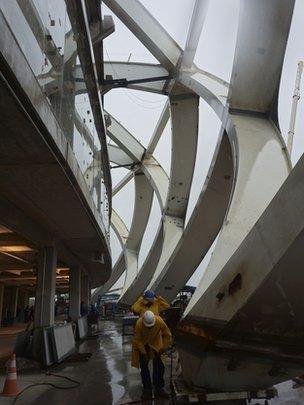
The Manaus stadium bears some resemblance to Beijing's Bird's Nest
I walked up the steps from beneath the new Arena Pantanal, trying to envisage what it would be like for England's captain, Steven Gerrard, to lead his team out on to the pitch.
No-one, of course, yet knows how the group draw, which takes place on 6 December, will pan out, but the stadium in Cuiaba is nowhere near ready enough to play host to Steven Gerrard or indeed any international captain.
Still a huge building site, this is another arena built with public money in a remote part of Brazil.
But with no pitch, no seats and no roof, this gamble to use the World Cup as a beacon for development may have backfired.
Local officials have now admitted to the BBC that they will not make the deadline.
"We should be finished between the 15th and 20th of January," says Mauricio Guimaraes, the local official in charge of the stadium. He then, almost casually adds: "There won't be enough hotel rooms for the fans, but the city will manage."
From what I saw in Cuiaba, there is going to be a struggle to get the stadium ready before February or March at the earliest.
With regulation test events, as demanded by Fifa, still to take place, it is going to be touch and go in Cuiaba.
Inside the incomplete stadium in Cuiaba
'No World Cup'
"Nao vai ter Copa - there won't be a World Cup" has been the cry from the streets of several Brazilian cities all year, amid increasing anger at so much public money being spent on new stadiums - one of the main reasons behind continuing nationwide protests.
Back in Cuiaba, I met a group of young activists who predicted that there would be even more demonstrations during the World Cup itself.
"There'll be thousands of people in the streets protesting," says Bruno Boaventura, a young lawyer who has been an active part of the protest movement in this small, provincial town.
"We're not against the World Cup itself, but how the process of the World Cup has been made here. The public haven't been involved in any of the decisions."
Mariana Freitas agrees, as we sit in the tatty old colonial-era square in the middle of Cuiaba.
"I think people are angry because of this huge investment [in the stadium] that won't really be useful after the World Cup," she says.
"They could have done better things with the money, like investing in health and education which are bigger problems here now."
Most Brazilians, like the boys I watched in Manaus hoping to impress the local scouts on a bare, dusty pitch, still love their football.
Many in Brazil's far-flung regions say the country needs the investment and the new venues.
But with such stark realities about the readiness of some stadiums, Fifa is caught in an almost impossible situation.
- Published9 November 2013
- Published21 October 2013
- Published9 October 2013
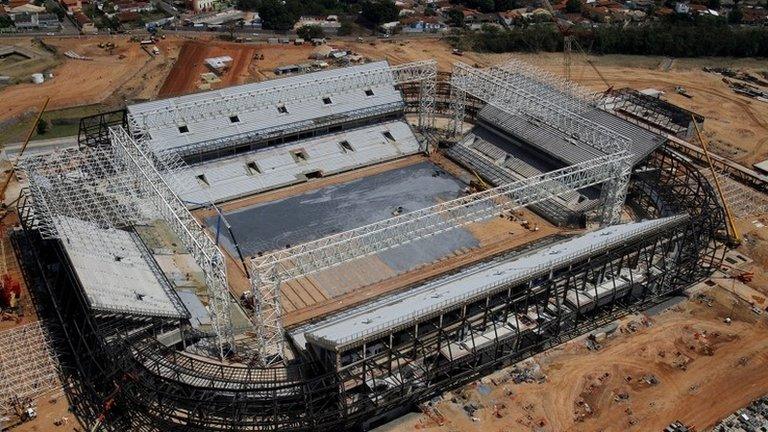
- Published21 August 2013
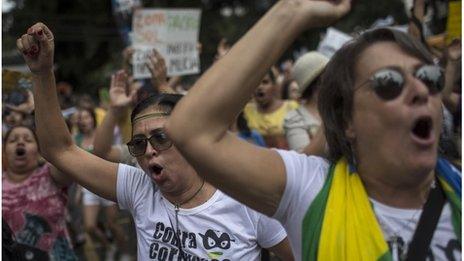
- Published26 November 2013
- Published13 August 2012
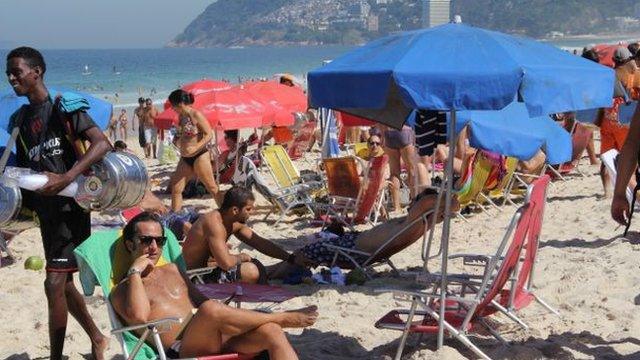
- Published8 June 2013
